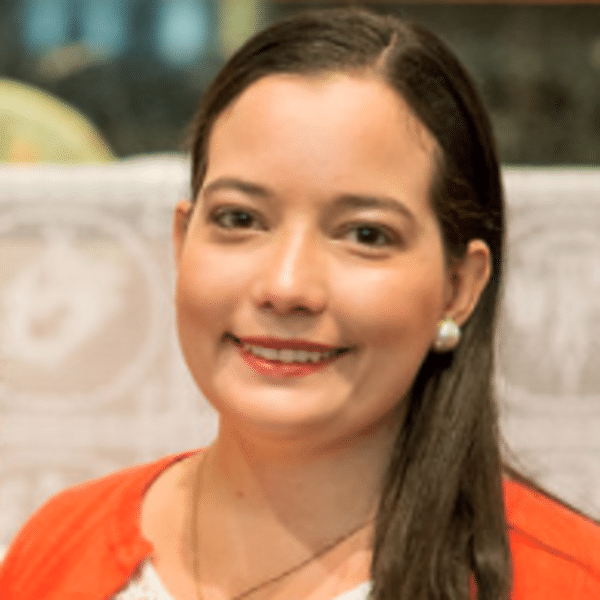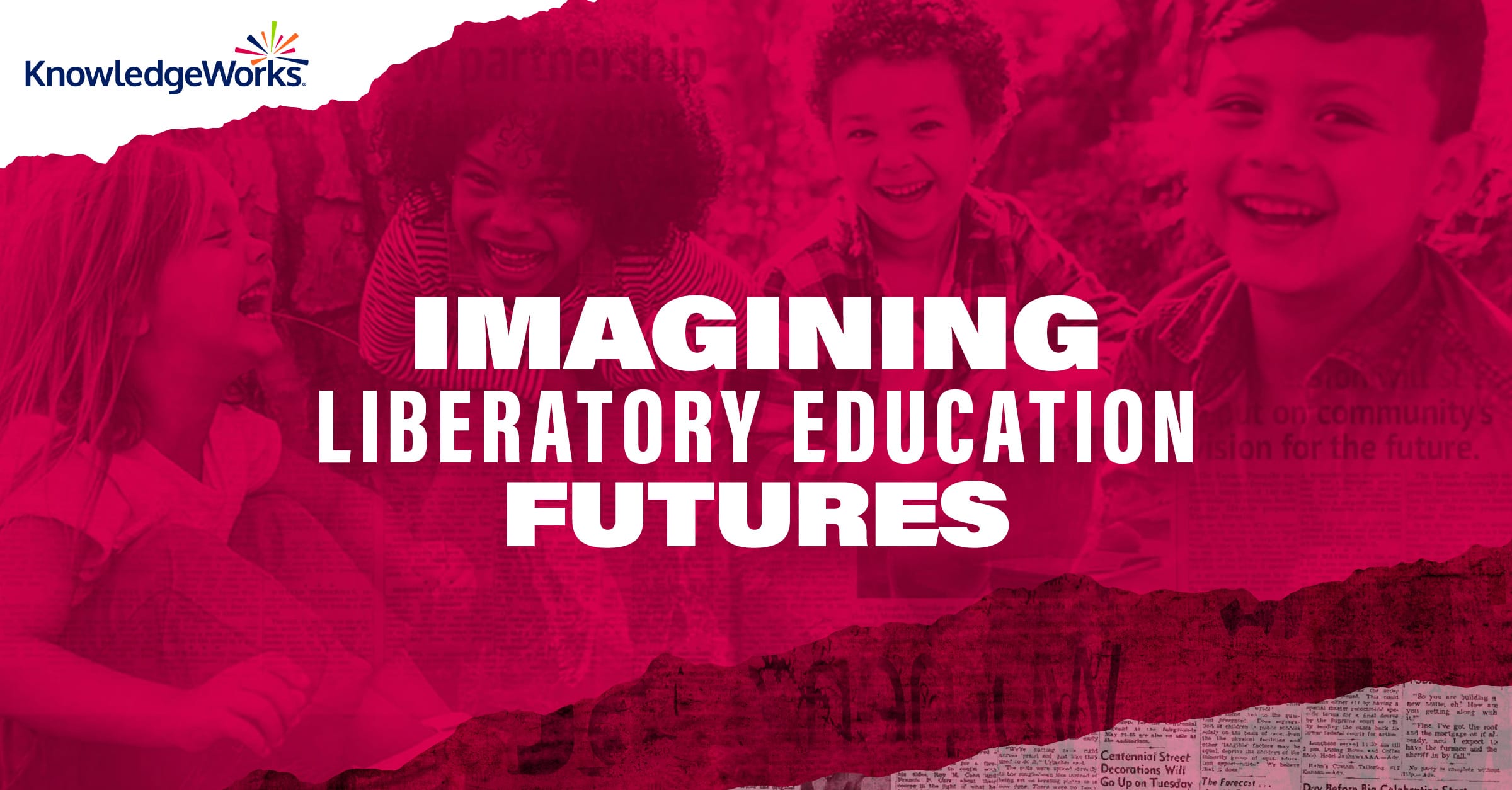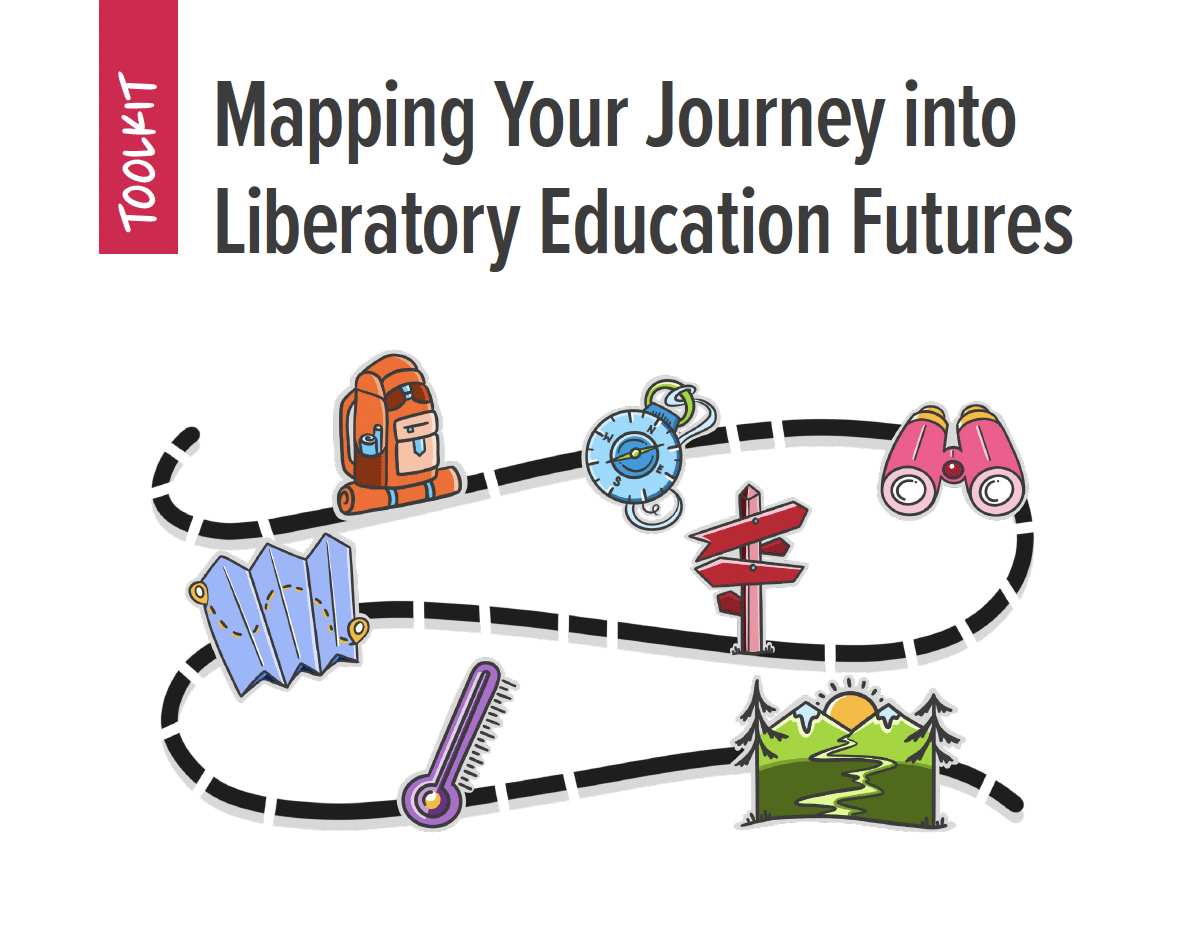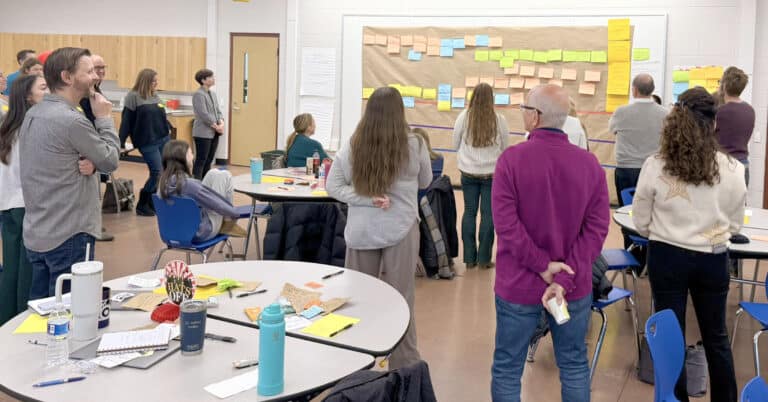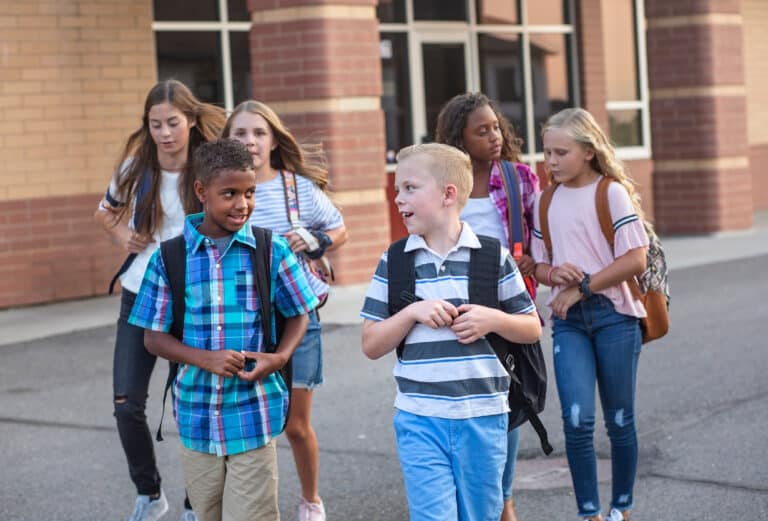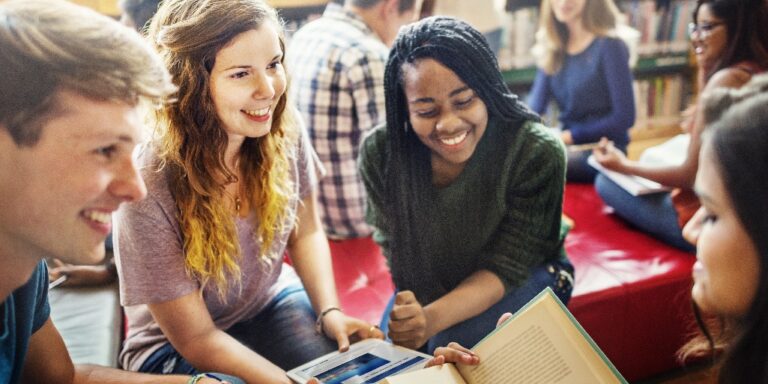Back in 2012, it looked as if a surge of innovation happening across knowledge-based industries could shake up education as we knew it, breaking down traditional models and creating novel approaches. We had been seeing the digital revolution disintermediate other sectors such as journalism, music, retail and healthcare and thought that something similar could happen in education.
KnowledgeWorks’ third major future forecast, Recombinant Education: Regenerating the Learning Ecosystem, anticipated some pretty significant reshaping of learning over the next decade:
As new education innovations, organizations, resources, and relationships proliferate, we have the opportunity to put the pieces – some long-established and some new – together in new sequences to create a diverse and evolving learning ecosystem. Just as genetic recombination increases diversity by producing new forms of DNA, so too education recombination promises to bolster the learning ecosystem’s resilience, helping it withstand threats and make use of possibilities.
Now that it is 2022, we have reached the time horizon of that forecast. As KnowledgeWorks has done with past forecasts, we are looking back at the future to take stock of the space between what we imagined might unfold and how education and the surrounding landscape look today.
Revisit the five disruptions that formed the core of the Recombinant Education forecast in these retrospectives:
By Maria Crabtree
Ten years ago, KnowledgeWorks captured the momentum of the seemingly innocuous entrepreneurial spirit in one of five disruptions to education included in its third forecast, Recombinant Education: Regenerating the Learning Ecosystem.
The forecast called it “Democratized Startup” and described it as the “transformational investment strategies and open access to startup knowledge, expertise and networks [that] will seed an explosion of disruptive social innovations.” And, while there have certainly been more space and increased desired for innovation recently, the changes have not exactly been socially driven.
Opportunity: the power of edupreneurs
With Democratized Startup, the forecast described futures in which school administrators could “become district and regional innovation portfolio managers who break new ground to meet the needs of all learners by strategically allocating time, resources, and energy to local and global initiatives with different levels of risk and reward.” In other words, they could become edupreneurs, educators who are also entrepreneurs in their own field.
Today states such as Kentucky, Texas, Mississippi and North Carolina designate some districts or schools as having a special innovation status, which allows administrators to have more flexibility to respond to their local needs; draft specific innovation plans by school level, grade or campus; and receive exemptions from mandates such as those related to academic calendars, attendance, class-size ratios and decision-making and planning processes. Being able to apply this startup mindset to public education increases districts’ and schools’ ability to compete with charter schools and other learning institutions by offering more tailored learning experiences to the communities they serve.
However, not all entrepreneurial lessons translate well to a public good like education. While some brave edupreneurs have been challenging the status quo for good, others have been doing so in the name of profitability. Education leaders should beware of the potential downfalls of following innovative paths without both accountability guardrails and active participation from those most impacted by current inequities in the education system. Robust diversity and inclusion values are needed to underpin the endless pursuit of more equitable and just outcomes for every learner.
Challenge: But what about education?
Unfortunately, the democratization of education would come at a price. The forecast anticipated that opening the education landscape to new players, both big and small, would cause new agendas to come into play. As a result, education leaders would need to step up and “ensure that student learning remain[ed] the central focus and that innovations reflect[ed] the best current thinking about learning.” This focus should be non-negotiable. For example, for far too long popular reading programs have successfully marketed themselves to schools, but recent studies are now questioning those programs’ results and evidence-based claims. It has taken some time, but school districts have finally started to drop the programs.
Another case that exemplifies the challenge of conflicting agendas is the wave of charter schools that has become the perfect setting for fraud, waste or abuse scandals. Negligent administrators have stolen money from the state and taxpayers and have siphoned resources from public schools in dire need of funding. Such actions toy with learners’, their families’ and their communities’ futures by denying them access to the learning experiences they need and deserve.
Innovation for innovation’s sake is just an empty, flashy box full of promises. Only when innovation efforts are aligned with articulated and shared visions of the future can education systems reap the benefits of using collective creativity to solve their biggest and most complex challenges.
The bottom line
Education, as a public good, should not have a bottom line or try to adapt too strictly to business models focused solely on efficiency and profitability. Although innovation can be a wonderful way to explore our collective potential, its benefits are only proportional to the motivations, goal and social values behind it. Innovation will always have a place in education, as it should. However, education stakeholders must hold one another accountable in the name of more human-centered learning systems for every learner.
By Maria Crabtree
The effects of collecting, analyzing and using massive amounts of data in education have been on KnowledgeWorks’ radar for the last 14 years, first with the Pattern Recognition driver from 2020 Forecast: Creating the Future of Learning and most recently with the Automating Choices driver from our fifth anchor forecast, Navigating the Future of Learning.
Each iteration has given us the opportunity to revisit a critical force of change based on current knowledge and the developmental stage and acceptance rates of the technologies that support the measurement and processing of data at large scale.
Ten years ago, in our third anchor forecast, Recombinant Education: Regenerating the Learning Ecosystem, the authors summarized these trends under a disruption, High-Fidelity Living. They wrote, “As big data floods human sensemaking capacities, cognitive assistants and contextual feedback systems will help people target precisely their interactions with the world.” Using data to generate insights is not inherently good or bad. However, the ways in which people decide to turn them into action or inaction could intentionally or unintentionally weaponize them. How have you been using data insights in the last ten years?
Opportunity: insights for personalization
The forecast suggested that education stakeholders looking to take advantage of High-Fidelity Living should “watch for massive data sets, learning analytics, and dashboards to enable radically and continuously personalized learning for all learners based on their performance and motivation.”
Organizations such as Panorama Education and Shmoop now offer visual tools that educators and administrators can easily use to look beyond standardized academic achievement data. These beautifully designed dashboards are developed by compiling and processing hundreds of records and measurements. The goal is that, by using these tools, decision makers can hone their supports to a personal level, helping every learner thrive.
Even KnowledgeWorks was bitten by the High-Fidelity Living bug when we began to invest more deeply in impact and improvement expertise and research related to the implementation of personalized, competency-based learning in our partner states, districts and schools. By rigorously measuring our progress, we expect to make better and more targeted decisions alongside every learning community with which we partner than we would be able to do without data-driven insights and a focus on continuous improvement.
Challenge: automating decision making
The pendulum can also swing too far and lean too heavily into High-Fidelity Living. This is why the forecast warned readers that “interventions based on automated alerts and signals could create data blindness by reducing human intuition and limiting insight; to the extent that automation correlates with lower cost, this risk could be especially pronounced in low-income communities.”
The truth is that imperfect humans are creating imperfect processing systems for imperfect data. How could that possibly create perfect decisions? Moreover, issues generally arise when educators are so overloaded that automation seems like a gift from the universe and/or when funds are so low that it makes economic sense. However, people and organizations, particularly those who are misrepresented in historic data sets, should not have to give into automating their decision making.
Systems which are automating decision making have spread in education. Automated essay scoring engines are a popular example because of the direct and indirect implications they can have on learners’ outcomes and the proven problems with bias. “Natural language processing (NLP) artificial intelligence systems — often called automated essay scoring engines — are now either the primary or secondary grader on standardized tests in at least 21 states, according to a survey conducted by Motherboard.” Only three of these 21 states ensure that every essay is also read by a human evaluator.
Other parts of the social sector have also been using automated tools to support human decision making. In child welfare cases across the country, automated data analysis is being used to determine the level of danger children might be in. The data used come from “jails, psychiatric services, public-welfare benefits, drug and alcohol treatment centers and more.” Systemic inequities make it relatively likely that low-income parents will be found in at least one of these data sets and be labelled “high risk” as a result. For example, parents in need of food stamps to feed their children do not have a choice but to surrender their private information to the government, which could later be used against them through a biased automated scoring system.
It’s time for course correction.
Luckily, the dangers of bias in the data that get fed to automated software, in society at large and in education, are now being heavily researched. The hope is that edtech organizations, in partnership with education advocates and other stakeholders, can figure out ways to make the processing of large amounts of data more equitable, inclusive and just for every person, thereby correcting the course of technologies that augment or supplant human decision making.
Initiatives to counter the effects of blind spots in data insights have already been created. There are tech systems to automate the identification of bias in other tech systems. There are also product certifications to hold edtech companies accountable for racial equity.
Such approaches should only be the beginning, though. Education leaders should make an effort to identify the platforms that are currently processing and interpreting big data and to understand fully the variables at play when these platforms make recommendations. This way, they can help ensure that data insights can be used to help people make better decisions instead of completely replacing human decision making. KnowledgeWorks will continue to be on the lookout for what might characterize the next chapter of big data in education.
By Jason Swanson
In 2012, the disruption of traditional institutions and sectors such as journalism, retail and healthcare was swirling fast and furious.
As KnowledgeWorks looked at how the digital revolution might similarly impact education in our Recombinant Education: Regenerating the Learning Ecosystem forecast, we described disintermediation, or the cutting out of the middleman, in a disruption called “De-Institutionalized Production.” This disruption described how “activity of all sorts [would] be increasingly independent of institutions as contributions [became] more ad-hoc, dynamic, and networked.”
In particular, this disruption highlighted how disintermediation would contribute to the changing nature of work as employment structures shifted from “a workforce to a talent cloud,” automation displaced human workers and people lived and worked longer. The forecast also explored how career pathways would become less linear, coming to “resemble personal mosaics of skills and experiences that [would] be documented through a multitude of alternate credentials, certificates, and reputation markers.”
The forces of disintermediation that were reshaping industries and contributing to the changing nature of work also promised to create changes in education. The authors of Recombinant Education saw opportunities and challenges for learning in a world that would become increasingly networked, dynamic and non-linear.
Opportunity: differentiation and specialization
The forecast identified an opportunity for the networked forms of organization described by the De-Institutionalized Production disruption to deliver new levels of differentiation and specialization in areas such as the design of educator roles and the provision of resources to schools. The forecast described the opportunity as follows: “Watch for schools to access specialized services and talent from global networks, creating new differentiated roles for ‘in-house’ learning agents and setting higher standards for both learning agents and learning resources.”
We can see this opportunity playing out today, as schools and their learning communities utilize networks to gain access to a wide variety of experts and services, many times in an ad-hoc and dynamic fashion. One example is Remake Learning, a network consisting of in- and out-of-school-time educators, innovators, researchers, learning scientists, researchers, policy makers and others. This network helps connect members who can share resources; partner on projects; and otherwise advance engaging, relevant and equitable learning practices. Such interconnections help members unlock new forms of knowledge and gain new skills. In addition, the ad-hoc partnerships that Remake Learning helps catalyze often lead to new roles in schools and to innovative, high-quality approaches to learning.
#DisruptTexts is another example of the networked differentiation and specialization envisioned in the forecast. #DisruptTexts is both a Twitter hashtag and website that links teachers to one another for the purpose of creating high-quality language arts curriculum that is inclusive, representative and equitable. The grassroots effort leverages a social media network to connect teachers, directly, around innovating and improving upon learning resources.
Challenge: spoiled for choice
The forces of change described in the De-institutionalized Production disruption reshaped many aspects of our lives and continue to do so. Alongside the opportunity described above, the authors highlighted the challenge of identifying the right options in a world of ever-expanding choices. The authors wrote, “In a world with wide-ranging learning options, new and varied credentials, and continuously changing demands, identifying essential knowledge and skills will be increasingly complex.”
People are indeed grappling with this challenge. One way that manifests is through schools’ and districts’ ongoing interest in thinking through what a profile of a graduate might look like as a way of surfacing and prioritizing the skills, knowledge and dispositions that their learning communities see as essential.
In addition, the emergence of new and varied credentials has created a need for transparency and quality assurance. As the credentialing field has expanded and diversified, platforms such as Credential Engine have been collecting and comparing credentials, helping employers and credential seekers make informed decisions about what credentials to seek and what they mean. This activity resembles the responsibilities of the future micro-credential analyst role that KnowledgeWorks forecast in Exploring the Future Education Workforce: New Roles for an Expanding Learning Ecosystem. This paper forecast that micro-credential analysts might perform audits of micro-credential options and digital portfolio platforms in order to provide learners and institutions with comparative quality assurance metrics.
From disintermediation to recombination
The disintermediating forces described by the De-Institutionalized Production disruption will eventually give way to the process of recombination, meaning that activities and sectors which have been broken apart or fragmented will remix into new approaches. New industries with their own unique needs will emerge, lifting up new perspectives on what skills, knowledge and dispositions people will need to thrive in the emerging employment landscape. At the same time, individuals will be tasked with assembling the right combinations of learning experiences and credentials to navigate this emerging reality.
Even as the forces of recombination gain steam, it is likely that schools and their learning communities will continue to form and access networks to meet their distinctive needs, including new skill sets for existing or entirely new roles. As explored in a forthcoming post, “Weaving Webs of Personalization,” this expanded reliance on networking will intensify the need for each school, learning community or credential provider to hone its value proposition as the choices and options available to learners continue to expand.
When was the last time that you had an experience that felt as if it had been created just for you?
It might be hard to remember, but this level of personalization and customization was not always the norm. Ten years ago, KnowledgeWorks’ third anchor forecast, Recombinant Education: Regenerating the Learning Ecosystem, explored the potentially disruptive power of creating highly personalized experiences. The forecast described the disruption, Customizable Value Webs, as follows: “Innovative, open business models will leverage complex networks of assets and relationships to create ultra-customer-centric experiences across industries.”
Customizable Value Webs remains a powerful disruptive force. However, the effects of this disruption on education are not always a given, and they present both challenges and opportunities to the field. As we reach the time horizon for the Recombinant Education forecast, we wanted to look back at the extent to which Customizable Value Webs has helped learners thrive or remained entrenched in inertia.
Opportunity: stitching together value propositions
The forecast saw opportunities for Customizable Value Webs to bring together various partners to engage students in personalized learning. Going beyond differentiated instruction, value webs made up of many different players, each with their own unique offerings, could be stitched together to create a unique, personalized learning journey for each learner. The forecast said, “Watch for schools to create distinct value propositions and identities and to partner with other organizations as part of complex value webs that offer personalized learning for all students.”
The notion of schools and other learning organizations offering distinct value propositions is still salient today. In a world with increased options for education, districts such as Upper Darby School District have been looking to develop their brand identity as a well to articulate their value and stand out from competition.
Schools and districts are also proactively seeking partnerships to bolster personalized learning opportunities. One such example is the Winchester Thurston School’s City as Campus initiative. This school develops partnerships with organizations throughout Pittsburgh to offer learners personalized experiences based on their individual needs, interests and goals. These personalized learning experiences leverage the partner organizations’ unique identities at the same time as they strengthen Winchester Thurston’s value proposition.
Challenge: weaving around obstacles
At the time the forecast was written, inertia seemed like a major challenge for education in responding to the Customized Value Webs disruption. The forecast cautioned, “If inertia prevents today’s public education system from responding constructively to disruptions, students, parents, and learning agents will create alternative value webs that may or may not be accessible to all.”
Inertia was and still is a major factor keeping education from fully leveraging possibilities for Customizable Value Webs. Public K-12 systems by and large lack the types of flexibility needed to create the ultra-customer-centric experiences imagined in this disruption and experienced in other sectors today.
To be sure, the movement towards personalization has been gaining momentum, with a recent poll conducted by the National School Boards Action Center showing that 74% of respondents agreed that “the lack of personalized learning focused on individual needs is a problem.” However, there are still foundational hurdles to delivering the ultra-customizable learning experiences that the forecast described. These hurdles relate to how current public K-12 education systems are designed. They include reliance on standardized, summative assessment systems; limited exposure to personalized learning frameworks during teacher pre-service certification; and credentialing systems that often ignore learning done during out-of-school time.
Beyond its current structures, public education has become a frontline in the ongoing culture wars. Its beleaguered position is charactered by the misrepresentation of Critical Race Theory, arguments around what can and cannot be taught in school and even opposition to social-emotional learning and whole-learner health. This type of resistance presents a significant obstacle for learners to access the types of ultra-customer-centric (or personalized) learning described in the disruption.
Despite these challenges, evidence of learning agents’ creating alternative value webs is emerging. As highlighted in KnowledgeWorks’ latest forecast, Imagining Liberatory Education Futures, there are a variety of scenarios in which education stakeholders might create alternative systems and structures to meet learners’ needs. In one of them, microstructures made up of hyper-local family and affinity groups would help weave value webs for students or cooperative webs of support, bringing together regional players such as in- and out-of-school time providers, community elders and local businesses to provide comprehensive learner supports. This kind of possibility is being brought to life by groups such as Brown Mamas, which combines the wisdom of Black elder women and new mothers to create resources to support the well-being of Black families, and The Lakota Oyate Homeschool Co-op, which created a remote learning pod to stay safe from the COVID-19 virus, teach in the Lakota language and integrate the Lakota culture into the curriculum.
A tangled web
The ability for schools and districts to create customizable value webs as described in the forecast seems to be moving ever closer to reality, but at a slower pace than anticipated.
At the time of its writing, this disruption presented a tangled web of future possibilities, and it largely still does. At one extreme, it presents a transformative force toward personalizing education and rethinking a school’s unique identity and value to a community. On the other extreme, it threatens to perpetuate inequities by offering alternative pathways to only a limited few. Despite this range of future possibilities, at its core the Customizable Value Webs disruption presents timeless questions about how education can best meet students’ needs, interests and goals and whether current public education systems will be able to do so for every learner.
By Katie King
In 2012, I wanted my students’ learning to be embedded in the place we lived, and I wanted their contributions to really matter and make that place better.
At the time, I was teaching middle school in a small town in far Northern California. I was excited by the prospect of grounding our learning in the context of our small community, one where I could easily access the editor of the newspaper, professors at the university and community leaders. Around this time, I also came across KnowledgeWorks’ Recombinant Education: Regenerating the Learning Ecosystem. The disruption Shareable Cities spoke to me.
In a one-page Disruption Digest, the authors summarized Shareable Cities as:
Next gen cities will drive social innovation, with urban infrastructure shaped by patterns of human connection and contribution. More and more people are living in cities, but cities—like all levels of government—find themselves increasingly challenged to meet citizens’ needs. At the same time, a do-it-yourself maker culture is shifting how people collaborate to solve problems. Instead of waiting for cities to get things right, citizens will come together to fill the service gap. Using rich information about what is happening where they live, citizens will create solutions that reflect where people are and what they need. Cities that use this new source of creativity effectively have the potential to spur economic development and embed learning across the urban landscape.
Ten years ago, I was excited about a future of learning that meaningfully connected learning to place. Today, teachers across the country still want that and are still working to make it a reality.
Now that we are in 2022, we have the chance to look back at the opportunities and challenges the forecast laid out to find out how they have played out, 10 years on.
Opportunity: the learning landscape
The forecast said, “Watch for learning resources and experiences to meld with other city services and infrastructures, such that urban indices rank cities by their learning landscapes, driving urban reinvention.” Outside of the United States, this opportunity is becoming a reality. The city of Helsinki has been recognized for its leadership in linking learning to place. Its regional transportation authority even offers free transportation to students and teachers so that they can learn anytime, anywhere.
Though truly integrated learning landscapes are not commonplace in the United States, this concept continues to gain traction and energy. When schools closed in the early days of the COVID-19 pandemic, community leaders and organizations came in to fill the gap. The Hub, run by parent organization Oakland REACH, provided necessary education for Black and Brown students and support for families during school closures. But they did more than simply recreate the educational experiences that students would have had in schools. They integrated social-emotional learning and culturally responsive, community-connected experiences, knowing that traditional education approaches were not designed to help students in their communities thrive. The organization and its programming are continuing to grow, even with schools fully open.
In addition, The Center for the Future of Museums noted the growing connection between museums and education, with schools co-locating in museums, the creation of more and more museum schools and increasing use of museum resources for learning during the pandemic. Education Reimagined has called learning that “lives everywhere” the “Big Idea” that can truly transform education. Many young people have said that the learning they experienced while navigating the pandemic and participating in racial justice uprisings in their communities was invaluable, showing the power of learning that is connected to place and purpose. “How can anything being taught in outdated textbooks ever compare to the real-world experiences we as students have gained in 2020-2021?” The New York Times quoted one student as saying.
And, while learning landscapes are not a common aspect of city rankings, The Schott Foundation, has produced a Loving Cities Index, which identifies indicators associated with academic and economic success and recognizes both in- and out-of-school factors as being critical for learning and well-being.
Challenge: access and quality
At the same time, the forecast also warned, “As learning becomes networked across city spaces and organizations, learning agents will need to ensure that all learners have access to the same range of services and that those services and their providers are of the highest quality.”
Those rich, community-based experiences have not been equally distributed. A coalition of young people in New York City recently filed a complaint with the U.S. Department of Education’s Office of Civil Rights, highlighting the ways academic screening processes for admission to high-quality high schools lead to inequitable outcomes. Their demands for change primarily focused on giving every New York City high school student access to high-quality, community-based learning experiences – including paid internships and extracurricular activities – that they say are not open to many students of color or students from low-income families.
Though the pandemic created opportunities for more out-of-school learning opportunities, expanding those opportunities does not seem to be a major focus for many schools, districts and states. Many are focused on addressing academic “learning loss,” which may lead to a doubling down on traditional approaches to teaching and learning. In the end, while learning landscapes might be emerging, the public school system is not engaging with them in a widespread way, despite evidence that community-based learning is an effective way to help students build academic knowledge and skills and support their mental health. This disconnect threatens not only the richness of educational experiences to which young people of color or from low-income families have access, but also support for public education, a critical element of a healthy democratic society.
Still seeking the shareable city
I still hold the aspiration that students can engage in relevant, real-world, community-connected learning, and I know that many educators, parents, students and leaders do, too. We still face opportunities and challenges in the pursuit of that goal, but we can be agents of change in turning our aspirations into reality.
These disruptions were major societal shifts that promised to have broad impact on the future of learning. We forecast that they would cause deep, and sometimes unsettling, change. But we also made the case that education stakeholders could use future uncertainty to spark creativity, not only fear.
As I scan these reflections, my big takeaway is that the wave of disintermediation that had been restructuring many sectors ended up affecting education less deeply than we had thought it might. Public education systems remain the dominant form of organizing learning, though they have innovated considerably. And, while personalized learning has spread, that has happened largely through traditional schools instead of through the expanded learning ecosystems that the forecast emphasized.
That said, there has been some regeneration of learning ecosystems – what the forecast described as putting together new combinations of learning experiences, resources and supports to meet learners’ needs and achieve systemic objectives. It has simply been uneven. In addition, we now have a more nuanced view of the promises and perils of bringing some technologies and big data into education.
How much change did the disruptions bring?
The last decade brought more interest in, and acceptance of, innovation in education. In working with educators to imagine future possibilities, I noticed this shift. Plus, we are all aware of how the COVID-19 pandemic forced educators’ hands in enabling more digital and hybrid learning. But, as Maria Crabtree highlighted when reviewing the Democratized Startup disruption from the forecast, innovation for innovation’s sake can falter or cause harm. Aligning innovation to shared and intentional visions of the future is necessary to ensure that education stakeholders work together to make education future-ready and supportive of each learner, especially those who come from historically marginalized yet resilient backgrounds.
The last decade has also seen significant movement toward personalized learning, along with attempts among schools and other learning providers to clarify their value propositions. In looking back at the Customizable Value Webs disruption from the forecast, Jason Swanson applauded these attempts to meet and support learners’ needs, interests and goals. Yet he also cautioned, as the forecast had, that we risk perpetuating inequities via systemic fracture or a proliferation of selective, boutique offerings. We need to tend the learning ecosystem more deliberately to make sure that each learner’s needs are met and that learners receive support in thriving in the ways that matter to them.
In looking back at the Shareable Cities disruption from the forecast, Katie King concluded that the public education system has not been engaging with expanded learning landscapes in a meaningful way and that access to community-based learning experiences remains uneven. A few strong examples of community-based learning ecosystems, such as Remake Learning and CommunityShare, exist in the United States. There is also a robust network of STEM learning ecosystems. It promises to be bolstered through the federal CHIPS and Science ACT 2022, which allocated funding for a new K-12 STEM grant program that will aim to scale up best practices. In addition, people around the world are working to foster learning ecosystems. But much of the collaboration between in- and out-of-school-time educators remains up to individuals.
While fully realized learning ecosystems remain uncommon, networks to support differentiation and specialization have spread. As Jason Swanson asserts in reconsidering the De-Institutionalized Production disruption from Recombinant Education, networks of educators are likely to have enduring power. In addition, educators and other stakeholders will have an ongoing need to identify and certify the knowledge, skills and dispositions needed for changing employment and civic sectors. While efforts to develop portraits of a graduate hold promise, our current, dominant forms of assessment and accountability seem inadequate for emerging conditions.
Big data is one tool that can help education stakeholders continue to consider the best systems and structures for supporting learners and for ensuring that learning is happening as intended. As Maria Crabtree argues in her review of the High-Fidelity Living disruption from the forecast, we need to use big data with caution. Education stakeholders need greater insight into the platforms that make automated recommendations based on it, and we need to make sure that big data is used to augment, not replace, human decision-making.
The weight of persistent inequities
It is taking education longer to disintermediate and regenerate than we thought it would when we wrote Recombinant Education. The pull of the status quo is strong. Whatever forms and approaches end up being right for the emerging era, we need to continue to encourage adaptation and informed risk-taking in education systems. We have not done enough to eliminate the persistent inequities that continue to lead to all-too-predictable outcomes for learners from historically marginalized yet resilient sub-groups. Let’s make a renewed effort to ensure that the world of learning described by the forecast becomes a reality for each learner.
For some ideas for what that might look like, check out the latest forecast forecast from KnowledgeWorks: Imagining Liberatory Education Futures.

